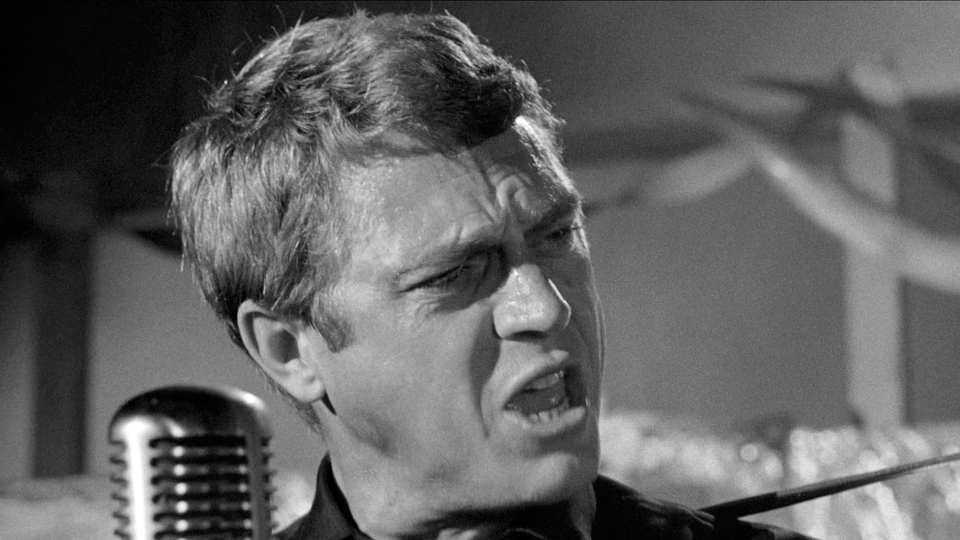Baby the Rain Must Fall

Elmer Bernstein fans should love this. Steve McQueen fans, maybe not so much.
The film opens with Lee Remick bussing across Texas with her six-year-old daughter. They’re on their way to meet her husband, the child’s father, played by McQueen. He’s been in prison on account of him stabbing someone during a drunken brawl in one of the honky-tonks he played as the frontman for his guitar band. Promising to go to night school and learn a trade, he’s made parole. But he soon joins another band and is back playing those same honky-tonks. After reuniting with his family, McQueen tries to do right by them, but is soon brawling and pulling knives, putting him on course for another prison stint.
The best way I can think to describe the film is to imagine asking a teenage boy in 1965 small-town Texas to write a story about a teenager in the vein of Tennessee Williams or Carson McCullers, then cast thirty-five-year-old Steve McQueen as the teen, and get Academy Award-winning Ernest Laszlo to shoot it, and Elmer Bernstein to score it. A-list talent in service of immature material.
Here, the material comes via Horton Foote, who adapted from his own play. He proffers a flavor of the young man angst that propelled Williams to fame, and grafts on a McCullers-esque Southern Gothic angle involving McQueen’s abusive adopted mother who lies dying in her gloomy, run-down manse.
Neither of these threads works, however, because the film feels too manufactured. Any sense of verisimilitude goes out the window as soon as McQueen opens his mouth to sing.
The voice, from a soundproof studio and tweaked with a judicious amount of reverb, is clearly not McQueen’s. It’s so jarring, and McQueen’s lip-syncing is so bad, I thought the film would acknowledge it. But no, that’s supposed to be his voice. This same studio sound comes out whenever he sings, be it in a cramped bar, on an outdoor stage, or in the middle of a desolate prairie.
Were this the film’s only fault, one could look past it, but the flaws run deeper.
Remick’s character is a cardboard ideal, always beautiful, never complaining, ready to go to work to help McQueen realize his dream of being famous. She never tries to set him straight, never forces the issue of doing right by their child. She’s there to be a perfect mother and a subservient wife.
Their daughter too, is perfect. She never whines and never complains. Indeed, McQueen’s family life is amazing, and utterly unrealistic, as though written by someone who’s never been married or had children.
Compounding matters, Remick and McQueen are too old for their parts. These characters should still be kids, probably early-to-mid-twenties.
At 30, I can buy Remick. Having a kid so young would have forced her to grow up fast. She earns her top billing, imbuing her part with a quiet dignity and leveraging sheer charisma to win us over when the script gives her no agency and little characterization. Her piercing blue eyes somehow transcend the monochrome film and her earnest, understated performance—complete with a believable accent—belies her character’s lack of depth. She has little to do, but proves magnetic doing it.
McQueen doesn’t fare as well. At 35, he looks closer to middle-age than teenage. His Texas drawl comes and goes. The scene where he’s yelling to his adopted mother’s bedroom door, “I’m not gonna quit my music!” had me laughing. Ditto a later scene where he’s telling Judge Paul Fix how he’s gonna stay in, “My string band!” This adolescent angst might have resonated coming from a younger man grappling with adulthood, but feels silly coming from a man-child.
And on top of it all, Laszlo’s immersive location photography looks too good. It lends the film a realistic veneer it can’t support, as the dissonance between its serious appearance and fantasy foundations renders its would-be heavy emotions pretentious, and its predictable plot tedious.
This shouldn’t have happened. Foote was married with children, not a naive teenager. McQueen was notorious for ripping out pages of his dialogue, yet here he delivers reams, looking uncomfortable the entire time. Why did he take the part? Was the script changed with late rewrites? Did post-production edits leave the missing depth on the cutting room floor?
Whatever the cause, I can’t recommend the result. But dissecting why it failed revealed the only player who grasped the material’s limitations. Bernstein’s score fits the script’s Frankenstein nature, proffering a melodramatic main theme and harpsichord-based kooky gothic music for the manse scenes. He even wrote the catchy pop theme song. So for any Bernstein super-fans out there, this one’s for you. Everyone else, move along.